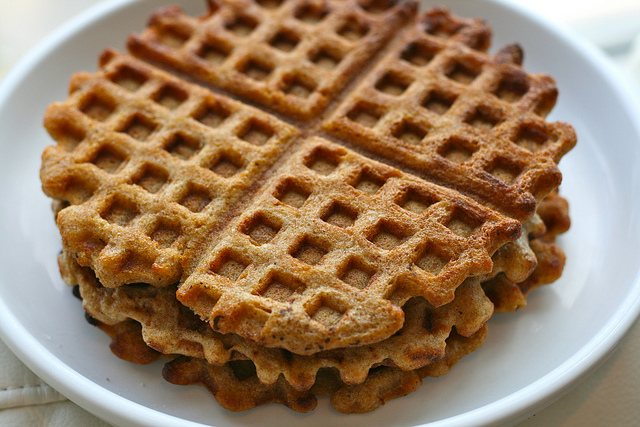
Are you currently grain free or on the full GAPS Diet to heal your allergies or another autoimmune issue?
Fear not, this can and should be only a temporary situation!
Dr. Natasha Campbell McBride MD, author of groundbreaking book Gut and Psychology Syndrome (GAPS), writes that almost half the population reports some sort of “allergy” to a food or foods.
Despite this sobering statistic, she estimates that only 1% of people cannot recover from these food allergies (yes, this includes celiac).
This means that only 1% of people really need to be grain free forever. Going grain free to reverse allergies should be only a 1 1/2 to 2 year process, not a lifelong sentence in the vast majority of cases!
The important thing is to know how to prepare your grains traditionally when you re-introduce them!
Plenty of Traditional Societies consumed grains, some like the Swiss obtained a large share of their calories from sourdough bread. Hunter-gatherers from Canada, the Everglades, Australia, Africa, and the Amazon consumed a variety of grains, tubers, vegetables and fruits that were available in addition to plenty of animal foods, so don’t fall for the incorrect notion that ancestral societies didn’t eat grains and that it is unhealthy to do so.
And, if you haven’t yet learned to prepare your grains traditionally and are still consuming plenty of modern grains on a daily basis, you better learn quick as the autoimmune/allergy train is coming down the tracks at full speed and it’s headed straight for you (if it hasn’t flattened you already)!
Knowing how to prepare grains traditionally is the only way to consume them long term without autoimmune illness inevitably cropping up, unless you are part of the 1% who needs to avoid them forever.
For most of us, then, traditional preparation of grains is an essential skill in the kitchen, one that must be mastered to experience vibrant health.
Please note that freshly grinding your flour and baking your own bread with yeast is not traditional preparation of bread!
Fresh bread that is homemade does not necessarily equal healthy bread!
Bread and other grain based foods must be sprouted, soaked, or sour leavened to be digestible and healthy!
So, go with the grain, not against it. It is not necessary to be grain free to be healthy and it’s certainly not very fun – at least not long term.
Eating, after all, is meant to be a pleasant and enjoyable experience and grain based foods no doubt play a big part in that.
Sarah, The Healthy Home Economist
Sources and More Information
Journal of Orthomolecular Medicine, Dr. Natasha Campbell-McBride MD, 2009
Nasty, Brutish and Short? by Sally Fallon Morell








Hi Sarah,
For my grain intake I am mixing brown rice with other grains (oat groats, rye berries, farro, kamut, quinoa, wild rice, red rice and black rice) After reading how difficult it is for our body to digest and nutritionally benefit from them, I am thinking to soak them overnight. My question is, am I overdoing it by mixing so many grains together? In advance, thank you for your feedback.
Rudy
I couldn’t agree more!! After years infected with the resistant H Pylori and weeks on antibiotics therapy, my gut was left pretty miserable. I cannot tell you how many nights I woke up feeling pain in my gut and sleeping throughout the day due to low energy and runny stools from undigested meals!
As you’ve said, you need a balanced diet! A diet with no so many grains and with no so much meat. I simply keep the bar low until my damaged gut heals which includes two servings of GF grains (buckwheat, millet and rice have worked wonders till now) and lean meat with veg and sometimes fruit!!
I did get a lot much better after starting probiotics!! But in the end not every other individual is the same so you have to study and research these things and experiment safely on your own until you start putting the diet together and stick with it!
Also another supplement which I would like to share with everyone and is proven to heal the gut are Zinc Carnosine and L- Glutamine. These two nutrients actually help the mucous membrane repair itself. Combine them with a probiotic and you’ll recover faster for sure!
[QUOTE}: “Please note that freshly grinding your flour and baking your own bread with yeast is not traditional preparation of bread!”
No, actually that IS the ‘traditional way’ of making bread. There is plenty of archaeological evidence to support sprouting (aka: malting) grains, there is not enough to make the statement that was how bread was ‘traditionally made”. Most ancient homes had a lower and upper millstone for grinding grains to make bread. Biblically speaking, what you claim is patently false.
The problem with grain-related illnesses these days is not because the grains are not malted, but because they are hybrid and often sprayed with glyphosate to dry out the moisture content to storage level percentages. How the bread is prepared also plays a key in gluten/ gliadin balance. Spelt, far higher in gliadin than wheat, is healthier than wheat. Go figure, counter-intuitive, but it shows that TYPE and process of grinding your own grain at home is your first best option. Avoid milled flour. Nasty stuff: calorie dense and nutritionally void.
Actually, your statements are not backed up with historical evidence. Baker’s yeast was first introduced as an alternative to sourdough starters in 1668 in France, it was strongly rejected because scientists at the time already knew that it would negatively impact people’s health. Some sort of sourdough starter for leavening was used prior to this time. There was no bakers yeast used to bake bred in in Biblical times.
Why would that not be a good idea?
Personally I find eating oats irritates my stomach, so I try to buy gluten free oats when I can.